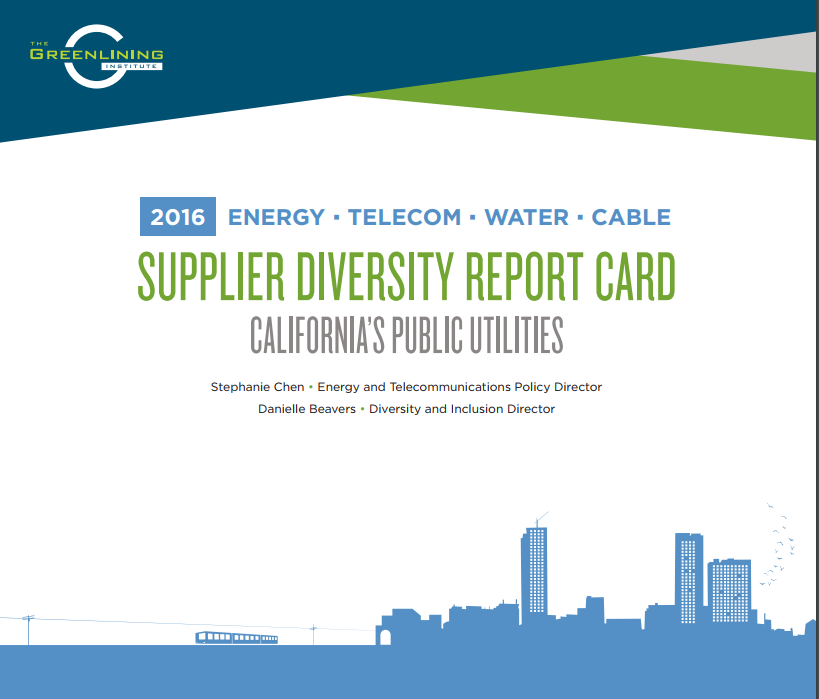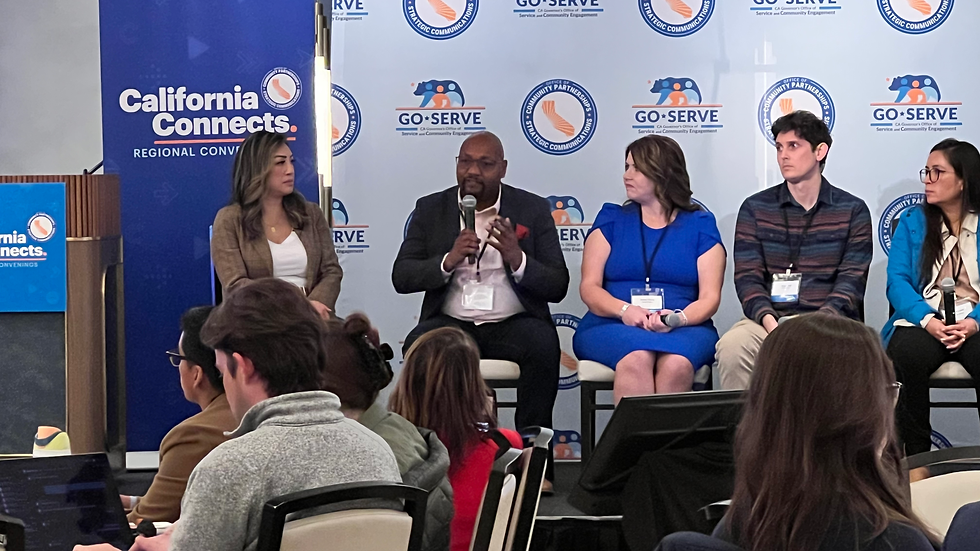Black businesses received small percent of contracting dollars from big utility firms in 2016
- INFO-MD Staff

- Oct 19, 2017
- 4 min read

Oakland, CA--Business the Golden State's largest utility enterprises did with African-American-owned firms last year fell behind in contracting the companies did with most other diverse or minority-owned businesses, according to a report by The Greenlining Institute.
The Oakland-based racial and economic justice organization's 2017 Supplier Diversity Report Card revealed that of the $6.2 billion 19 of California's biggest energy, water, wireless and cable and telephone firms spent with minority-owned businesses in 2016, only 16.67 percent of the contracting dollars went to Black companies. African-American businesses received just over three percent of the $32.24 billion the utility corporations contracted overall to vendors in 2016.
Greenlining's Director of Diversity and Inclusion, Danielle Beavers, said in an Oct. 5 interview, the day the report was released on Greenlining's website to the public, the answer to the question as to why large organizations don't do more contracting with Black companies is due to finances.
"Businesses of color have a harder time accessing and maintaining capital, compared to their counterparts," she said. "I don't think it's a lack of talent; I don't think it's a lack of opportunity because these utilities are spending billions of dollars a year. It's about the lack of support as a nation we have provided to diverse businesses."
California Black Chamber of Commerce, Board of Directors/member Sharon Evans said big businesses must look beyond just recruiting potential Black vendors from minority business groups. She suggested targeted outreach to identify suppliers and "investment in developing solutions to strengthen their African-American enterprises into areas of opportunity where utilization is low."
In June, California Black Media suggested targeted outreach to Black businesses through the California's various news publications, for the state's "Do Your Thing" campaign, an initiative spearheaded by the California Public Utilities Commission that encourages businesses and citizens to make smart energy choices.
The Black media group was rebuffed by CPUC Commissioner Carla Peterman, who said in an email to CBM executive Regina Wilson that an analysis by DDB Worldwide, an advertising group, showed that the best way to reach Black Californians is through television marketing.
"As such, the campaign is reaching African Americans within the existing buy, as well as some targeted programming for the African American audience," she wrote.
Peterman noted that some Black community groups – CBCC, California Black Health Network, United Negro College Fund and others – had signed on to work with the campaign.
Harking back to Evans suggestion though, Wilson said more must be done to reach African-American businesses and communities.
"Television marketing may incidentally reach some African Americans, but that isn't reason enough to skip over Black newspapers and media organizations," said California Black Media Chairwoman Regina Wilson.
"Our media owners have developed a deep relationship with the Black community that's quite different than the one with broadcast. If you want to run a successful communications campaign, it doesn't make much sense to exclude Black print, digital and radio. This just sounds like a reason not to invest in our community."
Wilson, also suggested the lack of a specific Black-focused outreach for the campaign could be why the utility companies analyzed for Greenling's study struggle to find Black businesses to contract with.
The utility giants evaluated for the study included AT&T Wireless, Sprint Wireless, T-Mobile, Verizon Wireless, Edison, SoCal Gas, PG&E, SDG&E, AT&T CA, Comcast, Cox, Frontier, CalAmWater, Cal Water, Golden State Water, Park/Apple Valley, San Gabriel Valley Water, San Jose Water and Suburban Water Systems.
The 19, the 53-page report outlined, spent 80.27 percent of their contracting dollars with non-minority businesses. The titans spent $9.5 billion on contracts with 978 diverse suppliers including $6.38 billion with minority outfits, $2.84 billion with women firms and $431 million with service-disabled veteran businesses.
The lion's share of the contracting monies – over 70 percent – the enterprises spent with minority suppliers went to Hispanic and Asian-American companies.
Greenlining's report evaluated and graded the firms on the amount of money spent on diverse and minority suppliers, the number of staff members dedicated to improving supplier diversity and how much money the corporations invested in supplier diversity programs.
Some companies – PG&E ($229.94 million), Cox ($252.08 million) and Sprint ($225.47 million) – spent several multi-millions on contracts with Black businesses. Others spent finite amounts – Comcast ($2.50 million), T-Mobile ($5.05 million), Frontier ($570,941) and Park/Apple Valley ($0).
Beavers commended PG&E, officially known as Pacific Gas & Energy, for the amount of money it spent on supplier diversity and the number of people working on supplier diversity.
In a press release announcing the study, Greenlining denigrated Comcast due in part to the cable provider awarding Black establishments a smidge above one half of one percent of its contracting funds.
"We can't help but be disappointed that a huge and influential company like Comcast shows so little regard for California businesses owned by minorities, women, disabled veterans and LGBT Californians," Beavers said.
Comcast acknowledged its diversity spending was challenged in its diversity report. The corporation blamed the dire straits of its diversity program on a supplier diversity coordinator leaving the company and the loss of its biggest "diverse prime construction contractor in 2014." Comcast said it hired a nationally-known diverse prime contractor last year, but the vendor, certified as a minority-business nationally, was ineligible to be recognized as a minority firm in California.
Beavers said some establishments might lack a strong commitment from their CEOs or the resources and personnel numbers to excel in supplier diversity. She said corporations look for the same things in minority suppliers as they do in businesses led by white males; a firm that will help them move towards their goals and address problems.
Beavers conceded there must be a concerted initiative to increase the number of Black businesses that get contracts with utility giants though.
"We see that in every industry when looking at supplier diversity, African-Americans are struggling to secure these opportunities," she said. "That's dangerous."








Comments